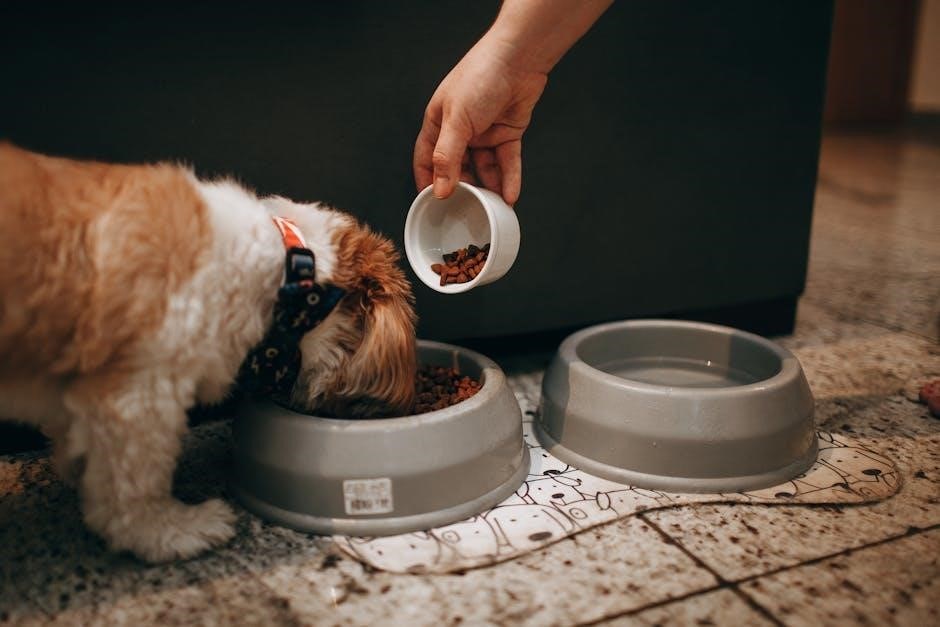The Beta Puppy Food Feeding Guide provides comprehensive advice on nurturing your puppy’s growth with tailored nutrition․ It covers essential feeding schedules‚ portion sizes‚ and expert-recommended nutrients for optimal health and development․

Understanding the Importance of Proper Nutrition for Puppies
Proper nutrition is crucial for puppies‚ as it directly impacts their growth‚ health‚ and development․ Puppies require a diet rich in proteins‚ fats‚ and essential vitamins to support their rapid growth and energy needs․ A well-balanced diet ensures strong bones‚ a shiny coat‚ and healthy organ development․ Without adequate nutrients‚ puppies may face developmental issues‚ weakened immunity‚ and long-term health problems․ Overfeeding or underfeeding can also lead to obesity or stunted growth‚ emphasizing the need for careful portion control․ High-quality puppy food‚ like Beta Puppy Food‚ is specifically formulated to meet these nutritional requirements‚ providing antioxidants and DHA for brain development and natural defenses․ Understanding these needs helps owners make informed decisions‚ ensuring their puppy receives the best possible start in life․

Key Nutrients for Puppy Development
Puppies thrive on diets rich in proteins‚ fats‚ and essential vitamins․ Beta Puppy Food includes antioxidants‚ DHA‚ and tailored nutrients to support brain development‚ immune health‚ and overall growth․
Proteins‚ Fats‚ and Essential Vitamins in Beta Puppy Food
Beta Puppy Food is formulated with high-quality proteins‚ such as chicken or turkey‚ to support muscle growth and energy․ Fats provide essential calories for puppies’ rapid development‚ while DHA aids brain and vision health․ The food also contains antioxidants to boost immunity and protect against oxidative stress․ Essential vitamins like A‚ D‚ and E‚ along with minerals such as calcium and phosphorus‚ ensure strong bones and teeth․ Beta Puppy Food is designed to meet puppies’ nutritional needs‚ promoting healthy growth and development․ It is 100% complete and balanced‚ tailored to support puppies’ natural defenses and overall well-being․ No artificial colors‚ flavors‚ or preservatives are added‚ ensuring a wholesome diet․ This nutrient-rich formula helps puppies thrive during their critical growth stages․
Feeding Schedule for Puppies
Feeding Schedule for Puppies requires adjusting portions as they grow․ Puppies under 3 months need 3-4 feedings‚ reducing to 3 times a day after 3 months․ From 6-12 months‚ feed twice daily‚ following the guide․
Age-Based Feeding Recommendations
Puppies grow rapidly‚ requiring tailored feeding schedules based on age․ Puppies under 3 months need 3-4 daily feedings of moistened food․ From 3-6 months‚ they can transition to 3 meals a day․ At 6-12 months‚ reduce to 2 feedings․ Each puppy is unique‚ so monitor their weight and adjust portions accordingly․ Use the Purina Beta feeding chart as a guide and consult your vet for personalized advice․ Consistency and gradual changes ensure a smooth transition to adult food․ Proper feeding supports healthy growth‚ energy‚ and development‚ helping your puppy thrive at every stage․

How to Use the Purina Beta Feeding Chart
Locate the feeding chart on the package‚ determine your puppy’s age and weight‚ and follow the recommended daily portions․ Adjust as your puppy grows for optimal nutrition․
Interpreting the Feeding Guidelines on the Package
To interpret the feeding guidelines on the Purina Beta package‚ start by locating the chart on the label․ It typically lists your puppy’s age and expected adult weight on the left side․ Match your puppy’s current weight and age to the corresponding column to determine the recommended daily portions․ Adjust the amount based on your puppy’s activity level and growth pace․ For puppies under 3 months‚ the chart may suggest 3-4 meals per day‚ while older puppies (6-12 months) transition to 2 meals․ Moistening the food is advised for younger puppies but should be gradually reduced as they grow․ Always refer to the packaging for specific instructions‚ as feeding needs vary by product and puppy size․ This ensures your puppy receives the right nutrition for healthy development․ Consult the chart regularly to adjust portions as your puppy grows․

Common Mistakes to Avoid When Feeding Your Puppy
Overfeeding can lead to obesity‚ while underfeeding may stunt growth․ Inconsistent schedules disrupt digestion‚ and ignoring portion guidelines can harm development․ Avoid these errors for a healthy puppy․
Overfeeding‚ Underfeeding‚ and Inconsistent Schedules
Overfeeding can lead to obesity and related health issues‚ such as joint problems and diabetes‚ while underfeeding may result in stunted growth and energy deficiencies․ Inconsistent feeding schedules can disrupt a puppy’s digestion and cause anxiety․ It’s crucial to follow the Purina Beta feeding chart‚ which provides portion sizes based on age and weight․ Avoid free-feeding‚ as puppies thrive on routine․ Monitor your puppy’s weight and adjust portions accordingly․ Consult your veterinarian if you notice any signs of overfeeding or underfeeding․ Consistency ensures proper nutrient absorption and supports overall development․ Always measure food accurately and stick to the recommended feeding frequencies to maintain a healthy balance for your puppy’s growth․
Transitioning to Adult Dog Food
Transitioning to adult dog food begins around 12-18 months when puppies reach 90% of their adult weight․ Gradually mix adult food with puppy food to prevent digestive upset․
When and How to Switch from Puppy to Adult Food
Transitioning your puppy to adult dog food typically occurs between 12 to 18 months of age‚ when they reach about 90% of their expected adult weight․ The process should be gradual to prevent digestive upset․ Start by mixing a small amount of adult food with their puppy food‚ increasing the proportion of adult food over 7-10 days until the diet is fully transitioned․Monitor your puppy’s weight‚ energy levels‚ and overall health during this period․ Larger breeds may need to switch earlier‚ while smaller breeds can transition later․ Ensure the adult food is nutrient-rich and suitable for their life stage․ Always consult your veterinarian for personalized advice‚ as they can recommend the best time and method based on your puppy’s specific needs and development․